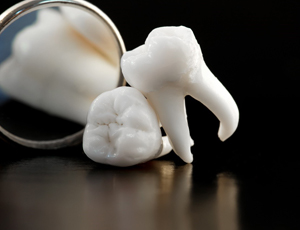Tooth Extractions – Herndon, VA
Gentle Extractions to Promote Long-Term Oral Health
No one likes the idea of getting a tooth extracted. However, tooth extractions in Herndon are sometimes necessary to enhance a patient’s oral health, relieve their pain, and prevent future dental problems. At Premier Dental Care, our team handles extractions with compassion and gentleness, all with a view to getting your smile back to feeling its best as quickly as possible. If you suspect you need to have a tooth extracted, contact us today to schedule your restorative consultation.
What Is a Tooth Extraction?
 A tooth extraction isn’t simply “pulling a tooth.” Rather, it is a delicate dental procedure that removes teeth while having a minimal impact on the surrounding tissue. In some cases, a tooth extraction is a simple procedure that takes just a few minutes. In other cases, such as when a tooth is stuck beneath the gum line (impacted), it’s necessary to create an incision in the gums in order to remove the tooth.
A tooth extraction isn’t simply “pulling a tooth.” Rather, it is a delicate dental procedure that removes teeth while having a minimal impact on the surrounding tissue. In some cases, a tooth extraction is a simple procedure that takes just a few minutes. In other cases, such as when a tooth is stuck beneath the gum line (impacted), it’s necessary to create an incision in the gums in order to remove the tooth.
We try to recommend extraction as a last resort, after we have considered other treatments. If we do decide that an extraction is necessary, we may discuss tooth replacement options with you so you won’t have to live with an incomplete smile.
Why Would I Need a Tooth Extraction?
 There are a number of reasons why a tooth extraction might become necessary:
There are a number of reasons why a tooth extraction might become necessary:
- The wisdom teeth are threatening the health of the teeth around them or are causing other problems.
- A tooth is so badly damaged or decayed that root canal therapy or other treatments would not be able to save it.
- There is overcrowding in the mouth and extractions are necessary to make room for orthodontic treatment.
- A patient is going to receive dentures, so it is necessary to remove the remaining natural teeth.
- Advanced gum disease has caused the gums to recede so much that they are no longer able to provide adequate support for the teeth.
What Happens During a Tooth Extraction?
 First, we make sure you’re comfortable. We’ll use anesthetic to numb the tooth and the area around it. We also offer oral conscious sedation, which can help you remain calm and relaxed throughout your procedure. Then, we perform the extraction by gently breaking the ligaments that attach the tooth to the surrounding bone.
First, we make sure you’re comfortable. We’ll use anesthetic to numb the tooth and the area around it. We also offer oral conscious sedation, which can help you remain calm and relaxed throughout your procedure. Then, we perform the extraction by gently breaking the ligaments that attach the tooth to the surrounding bone.
After the tooth is out of your mouth, we’ll place gauze at the extraction site, and we’ll provide you with detailed instructions to make your recovery go as smoothly as possible. If you had a simple extraction, you should be feeling normal again within a few days. For surgical teeth extractions in Herndon (such as wisdom teeth removal), recovery generally takes a week or so.
Understanding the Cost of Tooth Extractions

Understanding the cost of tooth extractions in Herndon isn’t as simple as you might think. Ultimately, your final expenses will depend on several unique dental factors and how much your insurance is willing to cover. That said, our team is always happy to help with finances and will answer any questions you may have about your treatment costs. Simply give us a call, or ask for more information during your consultation.
Factors That Can Affect Tooth Extraction Cost

Dental emergencies can be just as unique as a patient’s smile. Because of this, dentists don’t typically have a set price for tooth extractions. Every patient’s cost estimate can vary, depending on factors like:
- How many teeth you’ll need to have removed.
- The type and location of the tooth that needs treatment. Molars, for example, are more difficult to reach and may take more time and resources to remove.
- Whether you’ll need a simple extraction or surgical extraction. Surgical extractions are more involved, so they tend to cost more than “simply” prying your tooth free.
- Dental sedation, if any. We’re happy to offer dental sedation to nervous or sensitive patients, but keep in mind this will add to your final bill.
- Your chosen tooth replacement – though not technically part of your extraction, it’s good to consider replacement costs when looking at your budget.
Rest assured, we’ll thoroughly examine your mouth and evaluate these factors during your consultation. Treatment costs are an important part of the discussion, and we’ll be as transparent as possible so you’re not surprised by unexpected expenses.
Does Dental Insurance Cover Tooth Extractions?

Fortunately, tooth extractions are considered to be medically necessary, major procedures. Most dental insurance policies will cover at least 50% of the associated costs. They also typically offer 50% coverage for tooth replacements. Still, it’s important to double-check the details of your dental insurance plan. Every plan is a bit different, meaning your insurance could cover more or less than expected.
We accept the vast majority of dental insurance plans, and our team handles claims on a daily basis. If you need help understanding your benefits, we’d be happy to review your plan and make sure you get the most out of your premium.
Tooth Extractions FAQs
Do Tooth Extractions Hurt?
Many people in Herndon experience anxiety around dental appointments, especially if they’re undergoing a major procedure like a tooth extraction. Our Premier Dental Care team understands that you might be feeling nervous and will do everything we can to help you feel calm and comfortable during your procedure.
For instance, we will numb the area before starting your procedure to keep the nerves in your mouth from sending pain signals to your brain. We also offer oral conscious sedation that’s prescribed as a pill you can take before arriving for your appointment so that the medication kicks in by the time we begin. That way, you won’t have to worry about any aches until the drugs wear off.
What is Recovery Like After a Tooth Extraction?
After your troublesome tooth is removed, your mouth must form a blood clot at the site to shield the recently exposed nerves and bone tissue from bacteria in your mouth. If this clot is damaged or dislodged, you can develop a painful complication known as dry socket.
Our team will provide you with comprehensive post-operative instructions to follow and help you avoid this. For example, it is essential to get plenty of rest and avoid strenuous activities that increase your heart rate. You can keep your mouth clean by rinsing with salt water the first day to naturally disinfect it. After a couple of days, it’s usually safe to resume brushing and flossing normally. You might also stick to soft foods for a few days to avoid triggering tenderness in your teeth or gums.
If you experience prolonged or persistent throbbing that doesn’t subside, contact our office so we can ensure you’re healing as intended.
Can I Leave the Space Empty Following My Extraction?
It’s natural to wonder if it’s simpler and less costly to leave the socket empty after your tooth has been removed successfully, especially if the gap is in the back of your mouth where no one is likely to see it. However, your teeth keep your jawbone strong and healthy by activating new bone growth every time you bite down and chew. You can lose up to 25% of the surrounding density within the first year of one going missing.
If your jawbone becomes too thin, it can no longer support your remaining teeth, and you could experience additional loss. Plus, your remaining pearly whites are prone to drifting out of alignment to fill in the space, which can wear down your enamel or cause a malocclusion. As a result, our team usually recommends that patients pursue a restoration as soon as possible.
What Are the Options for Replacing an Extracted Tooth?
There are several potential ways to close the gap in your grin. For instance, dentures can be customized to fit like a glove and contain the correct number of teeth to fill empty spaces or even rebuild entire arches. Dental bridges are another option that can replace one or several consecutive missing teeth.
However, the only way to prevent the jawbone degeneration that occurs after tooth loss is with dental implants. These are the only prosthetics that involve surgically placing a titanium rod into your jaw to function like a root. This is capped with a lifelike dental crown made to match your natural teeth for seamless results.

